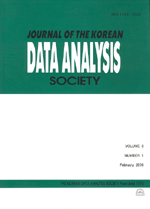토픽 모델링과 로지스틱 회귀분석을 활용한 한국 사회의 혐오 담론 탐구 및 정책 결정 과정과의 상관성 분석
Analyzing the discourse of hatred and its relationship with policymaking process using topic modeling and logistic regression
- 한국자료분석학회
- Journal of The Korean Data Analysis Society (JKDAS)
- Vol.24 No.5
-
2022.101989 - 2007 (19 pages)
-
DOI : 10.37727/jkdas.2022.24.5.1989
- 328

한국 사회의 혐오 담론은 어떻게 변화되어 왔는가? 또한 혐오 담론이 실질적으로 정책 결정과정에 미치는 영향력은 어떠한가? 다양한 선행연구들이 혐오에 관한 학문적 이해의 폭을 넓혔음에도 불구하고, 혐오 담론의 변화 과정과 혐오 담론이 정책 결정 과정에 미치는 영향력에 대한 이해는 여전히 부족하다. 본 논문은 2000년부터 2021년까지 한국 사회의 혐오 담론 지형을 실증적으로 파악하고 혐오 담론이 정책 결정 과정에 미치는 영향력을 살펴본다. 본 연구에서는 잠재 디리클레 할당(Latent Dirichlet Allocation, LDA) 기법을 활용하여 뉴스 빅데이터를 분석한다. 한국의 혐오 담론을 살펴본 결과 정치와 관련된 혐오는 지속적으로 높은 관심을 받아왔지만, 성소수자, 이민자, 남성, 플랫폼 등의 주제들은 특정 사건이 발생함에 따라 주목도가 상승하는 모습을 보였다. 이에 더해서, 로지스틱 회귀분석 모형을 통해 혐오 담론이 정책 결정 과정에 미치는 영향력을 분석함으로써 남녀갈등에 관한 혐오 기사의 수가 증가할수록 국회의원들의 여성 대상 폭력과 관련한 법안의 발의 확률이 감소한다는 점을 발견하였다. 또한, 성별과 혐오 기사 수와의 교차항을 활용하여 여성 의원들이 남성 의원들에 비해서 남녀갈등에 관한 혐오 기사의 수에 영향을 덜 받는다는 점을 검증하였다.
How the discourse of hatred in South Korea has changed and what is the effect of the discourse on the policymaking process? This article empirically examines the changes in the discourse of hared in South Korea from 2000 to 2021. Analyzing news big data based on the Latent Dirichlet Allocation(LDA) models, we found that the hatred related to politics has consistently received great attention. On the contrary, the salience of non-political hatred such as the hatred against LGBT, immigrants, men, and platforms fluctuates according to the occurrence of specific events. With the passage of time, new hatred topics including AI and COVID-19 emerge, but the existing types of hatred are observed even within the new themes. In addition, this article using logistic regression models demonstrates that there is a statistically and substantively significant relationship between the number of news articles concerning hatred against gender conflict and the probability of sponsoring bills about violence against women. Also, this article finds that male legislators compared to their female counterparts are more sensitive to the number of news articles about hatred.
1. 서론
2. 한국 사회의 혐오 담론 분석
3. 혐오 담론이 정책 결정 과정에 미치는 영향력에 대한 분석
4. 결론
References
(0)
(0)